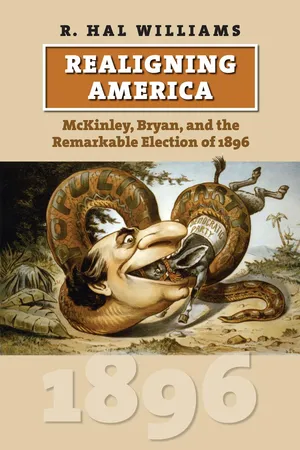
- 264 pages
- English
- ePUB (mobile friendly)
- Available on iOS & Android
About this book
The presidential election of 1896 is widely acknowledged as one of only a few that brought about fundamental realignments in American politics. New voting patterns replaced old, a new majority party came to power, and national policies shifted to reflect new realities. R. Hal Williams now presents the first study of that campaign in nearly fifty years, offering fresh interpretations on the victory of Republican William McKinley over Democrat William Jennings Bryan.
In tracing the triumph of gold over silver in this fabled “battle of the standards,” R. Hal Williams also tells how the Republicans—the party of central government, national authority, sound money, and activism—pulled off a stunning win over the Democrats—the party of state’s rights, decentralization, inflation, and limited government. Meanwhile the People’s Party, one of the most prominent third parties in the country’s history, which also nominated Bryan, went down to a defeat from which it would never recover.
Williams plunges readers into a contest that set new standards in financing, organization, and accountability, and he analyzes the transition from the long-dominant “military style” of campaign to the “educational style” that appealed to a savvier electorate. He also presents key players in new light: he views Bryan not simply as a gifted speaker whose “Cross of Gold” speech took the Democratic convention by storm, but as a more calculating politician with his eye squarely on the nomination; he depicts McKinley’s campaign manager Mark Hanna not as the one-dimensional fundraising machine painted by history but rather as a shrewd, insightful politician who understood what was required to get his man elected; and he presents retiring president Cleveland as an increasingly out-of-touch, irrelevant chief executive whom the Democrats repudiated in a way no other party ever had a sitting president.
With the Republicans’ star on the rise and the Democrats banished to the South and the cities, the 1896 election was more than a victory of one party over another, it marked the emergence of new ways of politicking that makes this campaign especially relevant for twenty-first-century readers.
Frequently asked questions
- Essential is ideal for learners and professionals who enjoy exploring a wide range of subjects. Access the Essential Library with 800,000+ trusted titles and best-sellers across business, personal growth, and the humanities. Includes unlimited reading time and Standard Read Aloud voice.
- Complete: Perfect for advanced learners and researchers needing full, unrestricted access. Unlock 1.4M+ books across hundreds of subjects, including academic and specialized titles. The Complete Plan also includes advanced features like Premium Read Aloud and Research Assistant.
Please note we cannot support devices running on iOS 13 and Android 7 or earlier. Learn more about using the app.
Information
Table of contents
- Front Cover
- Half Title
- Series Page
- Title Page
- Copyright Page
- Dedication
- Contents
- Editors’ Foreword
- Author’s Preface
- 1 1896: The Party Background
- 2 The Democrats in Power, 1893–1896
- 3 “The People against the Bosses”: The Republican Nomination of William McKinley
- 4 Democrats Divided: The Democratic Convention at Chicago
- 5 Bryan Takes the Stump
- 6 The Also-Rans: The People’s Party and the Gold Democrats in the Campaign of 1896
- 7 The Front Porch Campaign: McKinley and the Republicans in the 1896 Election
- 8 “An Excitement That Was Almost Too Intense for Life”: Election Day, 1896
- 9 McKinley’s America: The Election’s Aftermath
- Appendix A: Ballot Totals, Republican National Convention, June 18, 1896
- Appendix B: Ballot Totals, Democratic National Convention, July 10, 1896
- Appendix C: General Election Voting Totals, November 3, 1896
- Appendix D: William McKinley’s First Inaugural Address, May 4, 1897
- Notes
- Bibliographic Essay
- Index
- Back Cover